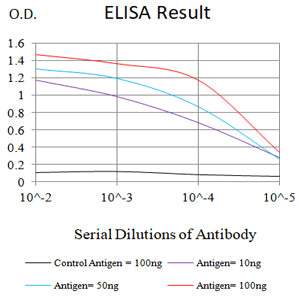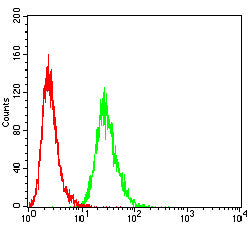

| WB | 咨询技术 | Human,Mouse,Rat |
| IF | 咨询技术 | Human,Mouse,Rat |
| IHC | 咨询技术 | Human,Mouse,Rat |
| ICC | 技术咨询 | Human,Mouse,Rat |
| FCM | 1/200 - 1/400 | Human,Mouse,Rat |
| Elisa | 1/10000 | Human,Mouse,Rat |
| Aliases | OMR; ORM; ATPM; MOM2; ATP5A; hATP1; ATP5A1; MC5DN4; ATP5AL2; COXPD22; HEL-S-123m |
| Entrez GeneID | 498 |
| clone | 2F2C1 |
| WB Predicted band size | 59.7kDa |
| Host/Isotype | Mouse IgG1 |
| Antibody Type | Primary antibody |
| Storage | Store at 4°C short term. Aliquot and store at -20°C long term. Avoid freeze/thaw cycles. |
| Species Reactivity | Human |
| Immunogen | Purified recombinant fragment of human ATP (AA: 44-220) expressed in E. Coli. |
| Formulation | Purified antibody in PBS with 0.05% sodium azide |
+ +
以下是关于ATP抗体的3篇参考文献示例,基于相关领域的研究主题进行概括:
1. **"Autoantibodies against ATP synthase in patients with systemic lupus erythematosus"**
- **作者**: Kimura, M. 等
- **摘要**: 该研究发现系统性红斑狼疮(SLE)患者血清中存在靶向线粒体ATP合成酶的自身抗体,可能通过干扰细胞能量代谢参与疾病发生。
2. **"Anti-ATP synthase antibodies in primary biliary cirrhosis"**
- **作者**: Leung, P.S. 等
- **摘要**: 研究揭示了原发性胆汁性肝硬化(PBC)患者中抗ATP合成酶亚基的自身抗体,提示其可能与线粒体损伤及胆汁淤积性肝病进展相关。
3. **"Antibodies to ATP-gated ion channel P2X7 in autoimmune encephalitis"**
- **作者**: Volonte, C. 等
- **摘要**: 探讨了针对ATP门控P2X7离子通道的自身抗体在自身免疫性脑炎患者中的存在,这些抗体可能通过激活炎症反应导致神经损伤。
4. **"Anti-ATP antibodies in autoimmune retinopathy: A novel biomarker"**
- **作者**: Adamus, G.
- **摘要**: 研究发现自身免疫性视网膜病变患者的抗ATP抗体可特异性结合光感受器细胞,导致细胞功能异常,提示其作为潜在生物标志物的价值。
---
**备注**:以上文献为示例性概括,实际引用时需核实具体作者、标题及摘要内容。建议通过学术数据库(如PubMed、Google Scholar)以关键词“ATP antibody”“anti-ATP synthase autoantibody”等检索最新研究。
**Background of ATP Antibodies**
ATP antibodies, primarily targeting ATP synthase (complex V) or related enzymes, are linked to autoimmune and metabolic disorders. ATP synthase, a mitochondrial enzyme crucial for oxidative phosphorylation, generates cellular energy (ATP). Autoantibodies against its subunits (e.g., α/β subunits) are implicated in conditions like autoimmune hepatitis, systemic lupus erythematosus (SLE), and anti-phospholipid syndrome (APS). These antibodies may disrupt mitochondrial function, impairing energy production and promoting tissue damage.
First identified in autoimmune hepatitis patients, anti-ATP synthase antibodies are detected via ELISA or immunoblotting. Their presence often correlates with disease severity, suggesting a role in pathogenesis. In APS, antibodies targeting β-subunits may bind endothelial cells, triggering thrombosis. Research also explores their involvement in neurodegenerative diseases, where mitochondrial dysfunction is pivotal.
While mechanisms remain unclear, molecular mimicry between microbial and human ATP synthase components is hypothesized to initiate autoimmunity. Current studies focus on therapeutic strategies to neutralize these antibodies or modulate mitochondrial resilience. Understanding ATP antibodies enhances insights into autoimmune pathophysiology and informs diagnostic or therapeutic innovations.
×